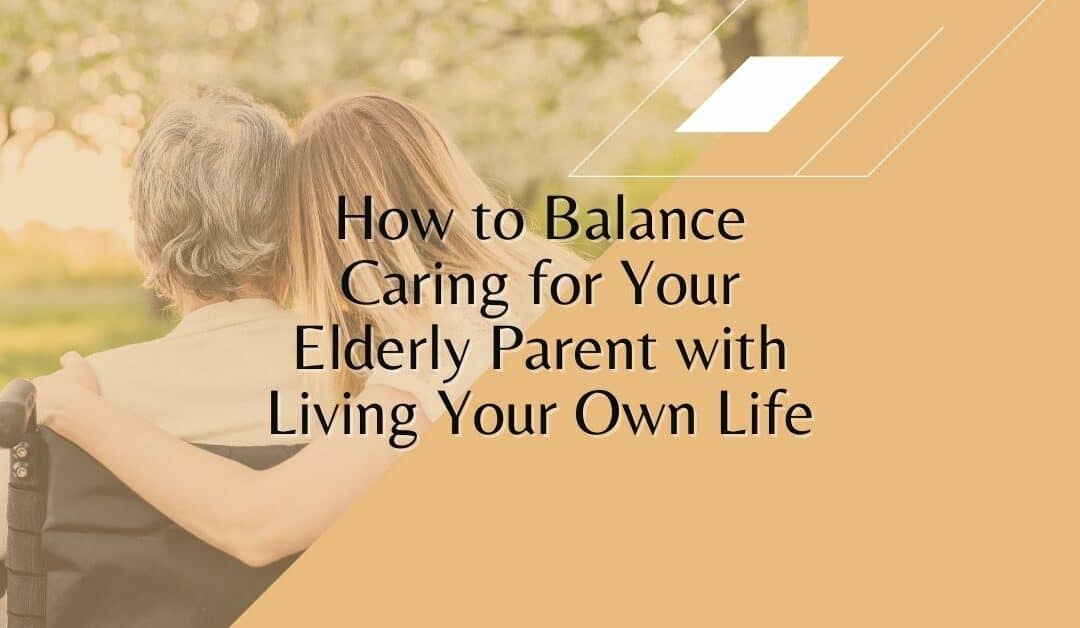When caring for an elderly parent, finding the right balance between caring for them and living your own life can be challenging. On the one hand, you may feel like you need to put your everyday life on hold indefinitely to care for them. However, this may not be possible or desirable. It can feel like giving up your life to care for an elderly parent is a caring choice. However, balance is key when becoming a caregiver. There are many ways to get help from your community, Medicaid resources, or other family or friends. Let’s explore some of these options and help you find the best way to care for your elderly parent while still living your own life!
Know Your Limitations
Caring for an elderly individual with a disability can feel stressful and exhausting for family members and even increase the chances of suffering from depression or other health problems. If you feel like you are giving up your life to care for an elderly parent, you may need to take a step back and look at the situation. The issues that contribute to burnout include:
- Loss of your own everyday life
- Prolonged distress of your parent
- Your stress levels
- Physical demands of caregiving such as not sleeping enough
The first step is to accept that you cannot do everything independently. It is essential to know your limitations and ask for help when needed. Asking for help can be difficult, but it is necessary to maintain your own health and wellbeing.
What is Caregiver Burnout?
Caregiving can be rewarding, but it also takes time and energy. Caregiver burnout happens when you forget to take care of your own needs and instead take care of someone else’s. Caring for an elderly parent around the clock can cause burnout. If you find yourself in a state of physical, emotional, and mental exhaustion, you’re in burnout and need a break.
Stressed caregivers often struggle with fatigue, anxiety, and depression. Joining a caregiver support group and using respite care services can help caregiver burnout. Respite care allows someone else to step in and give you a break sometimes so that your perspective rebounds.
According to Aging in Place, “At least 20% of adult children are taking care of an older parent. About 85% of family caregivers in the U.S. do not receive any respite care. The last phase of life is generally 4.5 to 5 years.”
If you don’t care for yourself as you care for an aging parent, you could end up sick or need care yourself.
Resources to Prevent Burnout
There are many community resources available to help care for an elderly parent. These include home health aides, adult day care centers, Meals on Wheels, transportation services, and more. Finding help from community resources for an elderly parent can be as easy as talking to their friends from a book club, religious or community organization that might band together and help with a daily meal to take some of the burden off the primary caregiver.
Medicaid also provides some home- and community-based services that can help with the cost of caregiving.
Another excellent resource for caregivers is family and friends. They can provide emotional support, respite care, financial assistance, or simply lend a hand when you need it.
If you only need to help your parent prepare their medications and stop in for dinner each day, you might enjoy the role of helping and caring for your parent. However, if your parent has a progressive mental disorder such as dementia or Parkinson’s, there may come a time when you need multiple other people to help with their care. Staying realistic about what you can provide without hurting yourself is crucial.
Nursing Homes & Assisted Living
It’s essential to understand what your parent needs and whether you can provide that level of care. For example, let’s say your parent needs assistance with bathing, dressing, preparing every meal, and constant monitoring, so they don’t run off. In that case, you can’t expect yourself to carry that level of care on your own.
Respite Care is when you allow someone else to care for your parent for a brief time so that you can consider the other aspects of your life or get some needed sleep. There are often community daycare programs or even temporary stays at assisted living centers so that you can get some much-needed time off.
There may come a time when your parent can get the best care in an assisted living or nursing home. Understanding that you can’t always handle every aspect of their care on your own is a realistic assessment of your human limitations.
Qualifying for Benefits
Depending on your parent’s income and resources, they may qualify for Medicaid resources for in-home care that can cover:
- Home health aide services
- Skilled nursing services
- Medical supplies
- Physical therapy
- Speech-language pathology
- Occupational therapy
If your parent has a mental challenge, they may need around-the-clock care. The only way to provide this is to have some help. Medicaid can often help grown children care for a beloved parent without facing caregiver burnout.
We Can Help
If your parent needs help making end-of-life plans, Renaissance Funeral Home is here to help. We spend time with you, learning what you and your family need to grieve your loss best together. Our passion is creating beautiful and memorable events to bring loved ones closer. Get started making a pre-plan for yourself, or contact us if a loved one passes away. We understand how difficult this time is for you and are here to ease the burden of planning. Contact us today and find out how we can help.
Sources:


